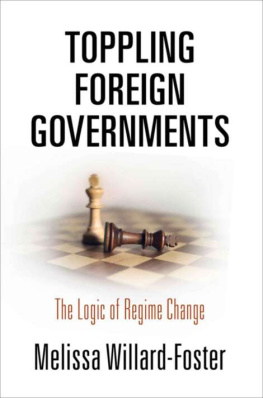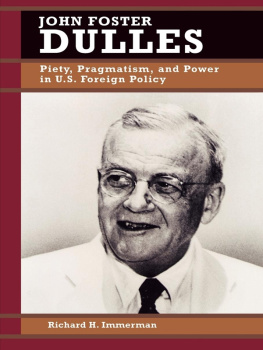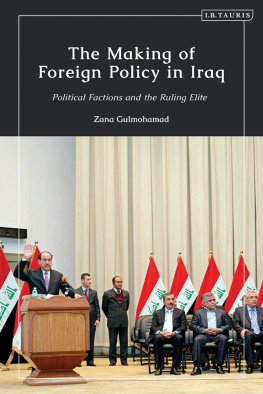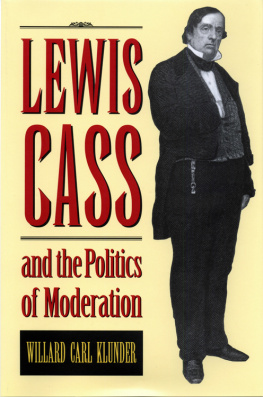Melissa Willard-Foster - Toppling Foreign Governments
Here you can read online Melissa Willard-Foster - Toppling Foreign Governments full text of the book (entire story) in english for free. Download pdf and epub, get meaning, cover and reviews about this ebook. year: 2018, publisher: University of Pennsylvania Press, Inc., genre: Politics. Description of the work, (preface) as well as reviews are available. Best literature library LitArk.com created for fans of good reading and offers a wide selection of genres:
Romance novel
Science fiction
Adventure
Detective
Science
History
Home and family
Prose
Art
Politics
Computer
Non-fiction
Religion
Business
Children
Humor
Choose a favorite category and find really read worthwhile books. Enjoy immersion in the world of imagination, feel the emotions of the characters or learn something new for yourself, make an fascinating discovery.
- Book:Toppling Foreign Governments
- Author:
- Publisher:University of Pennsylvania Press, Inc.
- Genre:
- Year:2018
- Rating:4 / 5
- Favourites:Add to favourites
- Your mark:
- 80
- 1
- 2
- 3
- 4
- 5
Toppling Foreign Governments: summary, description and annotation
We offer to read an annotation, description, summary or preface (depends on what the author of the book "Toppling Foreign Governments" wrote himself). If you haven't found the necessary information about the book — write in the comments, we will try to find it.
Toppling Foreign Governments — read online for free the complete book (whole text) full work
Below is the text of the book, divided by pages. System saving the place of the last page read, allows you to conveniently read the book "Toppling Foreign Governments" online for free, without having to search again every time where you left off. Put a bookmark, and you can go to the page where you finished reading at any time.
Font size:
Interval:
Bookmark:
Toppling Foreign Governments
TOPPLING FOREIGN GOVERNMENTS

The Logic of Regime Change
Melissa Willard-Foster

UNIVERSITY OF PENNSYLVANIA PRESS
PHILADELPHIA
Copyright 2019 University of Pennsylvania Press
All rights reserved. Except for brief quotations used for purposes of review or scholarly citation, none of this book may be reproduced in any form by any means without written permission from the publisher.
Published by
University of Pennsylvania Press
Philadelphia, Pennsylvania 19104-4112
www.upenn.edu/pennpress
Printed in the United States of America on acid-free paper
1 3 5 7 9 10 8 6 4 2
A Cataloging-in-Publication record is available from the Library of Congress
ISBN 978-0-8122-5104-3
For Amelia, Evan, and Maggie
CONTENTS

Introduction
On March 19, 2011, eight years to the day after the start of the Iraq War, the North Atlantic Treaty Organization (NATO) began launching airstrikes at Libya in the third American-led attempt in a decade to topple a foreign leader. After two costly wars in Iraq and Afghanistan, few would have predicted President Barack Obama would lead the United States into another attempt at regime change. As a senator, he had opposed doing so in Iraq, insisting Saddam Hussein posed no imminent threat and could be contained given the weakened Iraqi economy and military. Like Saddam, Libyas Muammar Qaddafi posed no threat to the United States. He had weakened his own military in order to coup-proof his regime. He also no longer had the allies or the chemical weapons he had once possessed to protect himself. Qaddafis military vulnerability should have given him the incentive to seek a settlement and avoid a war that he could not win. But if Qaddafi, like Saddam, could have been coerced and contained, why was the United States pursuing regime change again?
The failure to establish stable, friendly regimes in Afghanistan, Iraq, and Libya has led scholars and politicians alike to question the wisdom of foreign-imposed regime change (FIRC), and perhaps for good reason. Studies show FIRC (or simply regime change, as I will also refer to it) increases the risk of civil war in the target state and rarely creates democratic regimes. In addition, studies examining whether FIRC improves relations with the target state show mixed results. But despite FIRCs dubious record, regime change has been a persistent feature of the international system for centuries. It has taken many forms throughout this historyfrom foreign-instigated coups to large-scale military invasions, but whatever the form, the goal has been the same: to change the policies of other states by changing their policymakers.
Regime change, however, is but one arrow in the quiver from which states can draw to achieve their foreign-policy objectives. And, as recent American experience suggests, it can be a costly one. Rather than replacing the opposing sides leaders, states could bargain with them instead. The state seeking change could use coercion and/or inducement to obtain a favorable deal, formal or otherwise. It could also soften some of its demands to attain its most central policy aims. It could even give up on those aims altogether and accept the status quoin essence, accepting a deal on the targets terms. Conflicts between states can be resolved in a variety of ways. Why do states take on the costs and risks associated with regime change to resolve their conflicts, instead of pursuing these other options?
Standard accounts in the historical and intervention literature suggest a seemingly straightforward answer to this question. States depose foreign leaders because they expect they can install like-minded ones with whom they will not have to bargain. Accordingly, much of this scholarship focuses on the policy objectives underlying FIRC, rather than on why states use it to obtain their objectives. What remains unclear is why a state would risk blood and treasure to install a more pliant leader when it could use presumably less costly means, such as coercion and/or inducement, to change the preferences of the current leader. Even when a state must apply limited military force to coerce a foreign leader into a settlement, it could still avoid the potentially heftier costs of installing a new leader by bargaining instead.
The question of why states forsake bargaining for regime change becomes all the more puzzling when we consider that leaders typically targeted with regime change should be relatively easy to coerce into settlements. Although states also target the equally powerful, that parity disappears by the time they achieve the military victory necessary to impose regime change. Hence, unequal power is a near-universal feature of FIRC. Though this asymmetry of power makes an imposed change feasible, it should also make that change unnecessary. To avoid being overthrown, militarily weak leaders who are bereft of allies should back down when confronted by stronger states. Instead, FIRC targets sometimes appear to invite their fate by defying stronger states. To fully understand FIRC, we must, therefore, explain why it occurs when it should be least necessary.
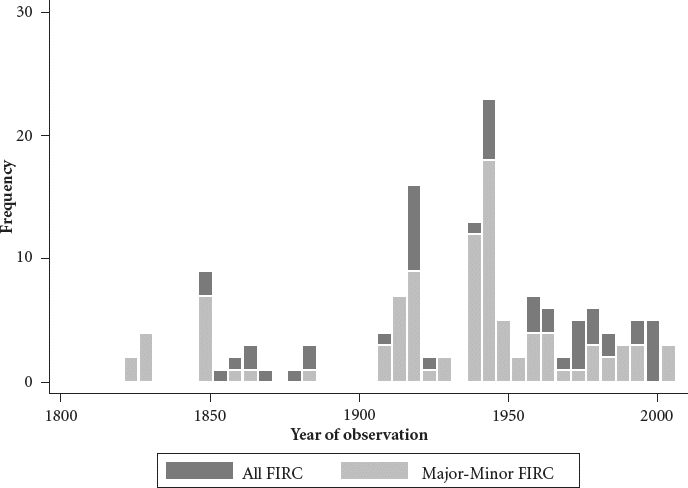
Figure 1. Foreign-Imposed Regime Change Attempts, 18162007
The Logic of Foreign-Imposed Regime Change
This book explains why states choose to overthrow foreign leaders or regimes rather than bargain with them. In so doing, it addresses three related questions: (1) Why do the weak resist the strong? (2) Why do the strong respond by imposing regime change? And, (3) when is FIRC aimed at deposing a leader versus at upending or transforming political institutions? The answers to all three questions, I argue, hinge on the strength of the targeted leaders domestic political opposition. When a conflict of interest arises between a strong and weak state, the stronger state may pressure the weaker one to accept a settlement. Targeted leaders, however, have an incentive to resist or renege on these settlements whenever compliance will weaken them at home. If leaders accept terms that compromise their already tenuous political positions, their domestic opponents may challenge them. These opponents could be rivals within the regime or insurgents seeking to overthrow it. Opposition can also be latent, ready to erupt if the leaders concessions provoke widespread anger. No matter its form, the stronger this opposition already is, the more successful its domestic challenge will likely be and, thus, the more resolved the targeted leader will be to reject the foreign powers demands. Even when defeated in war and forced to accept imposed terms, leaders may later renege to shore up their domestic political power.
Two conditions must be met for a foreign power to achieve its aims at the bargaining table and reject attempting regime change. First, the foreign power must give the target reason to concede by proving that the foreign threat the target faces is greater than its domestic one. Although the foreign power may have a greater military capacity, the targeted leader may not believe the more powerful state will use its full capabilities. To make its threats credible, the stronger state can use costly signals, actions so costly that less resolved actors would avoid them. By mobilizing troops or acquiring arms and allies in preparation for war, a foreign power could convince others of its determination to fight. To be sure, costly signals may not always convince the target to back down. When targeted leaders face particularly intense domestic threats, they may risk war, hoping to hold out in a protracted conflict. Yet, even in these cases, foreign powers often can convince militarily weak leaders to concede by applying coercive force or, in extreme cases, defeating the target militarily. Once the foreign power achieves a military victory, it should be able to force the targeted leader to accept its terms.
Next pageFont size:
Interval:
Bookmark:
Similar books «Toppling Foreign Governments»
Look at similar books to Toppling Foreign Governments. We have selected literature similar in name and meaning in the hope of providing readers with more options to find new, interesting, not yet read works.
Discussion, reviews of the book Toppling Foreign Governments and just readers' own opinions. Leave your comments, write what you think about the work, its meaning or the main characters. Specify what exactly you liked and what you didn't like, and why you think so.

